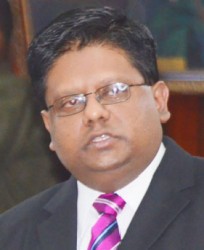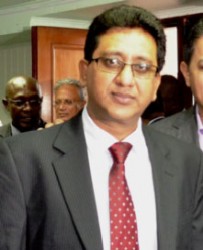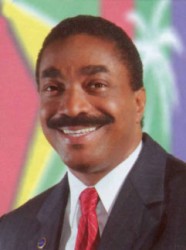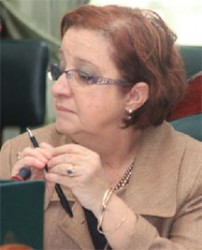APNU and the AFC effectively killed the government’s hopes of passing the anti-money laundering bill before a November 18th deadline set by the CFATF when they voted against its third reading last night in the National Assembly.
Leading up to the reading, several Government Parliamentarians, including Legal Affairs Minister Anil Nandlall and Finance Minister Ashni Singh, implored the opposition to vote to pass the Bill, but these pleas fell on deaf ears as both the Alliance for Change (AFC) and A Partnership for National Unity (APNU) stuck to their guns and opposed the Anti-Money Laundering/ Countering the Financing of Terrorism (AML/CFT) (Amendment) Bill. This move was not surprising as both parties have consistently vowed opposition to the bill, albeit for differing reasons.


APNU has, from the inception, maintained that the Bill in its current form is insufficient, while the AFC has demanded that the Public Procurement Commission be set up before they give support.
Although the opposition parties voted the bill down, it was evident that their initial plan of action entailed sending it back to the Select Committee level, where they would have had an opportunity to continue deliberations, and make the amendments deemed by them to be necessary.
This request was made by APNU MP and Financial Spokesman Carl Greenidge. Unfortunately for the opposition though, House Speaker Raphael Trotman informed Greenidge that Standing Order (SO) 65 (1) prevented his request from being granted. According to the Speaker, whose position was later reiterated by Nandlall, the request for the recommitting of the Bill needed to be made before the request for the third reading of the Bill.
Since Nandlall had already put the question for the third reading of the Bill to the National Assembly, the request for the Bill to be recommitted to the Committee could not be granted. Nandlall himself cited the SO 65 (1), and argued that Greenidge’s request was out of place, considering the reality of the SOs. As an alternative, APNU MP Basil Williams at one point attempted to move a motion to suspend the SO for Greenidge’s request to be made. He later withdrew his motion, on a request by the opposition side.
Recognising that the SO neutralised their initial plans, AFC Leader Khemraj Ramjattan then rose and stated that the opposition had no other options, and would therefore oppose the Bill when it came time to vote. This announcement was greeted by table slaps of approval from Ramjattan’s fellow opposition members, as government MPs watched on.
Noting the level of confusion being caused by the “procedural conundrum,” the speaker called a ten-minute recess for the purpose of conferring with the Clerk, and any other MPs who were interested in taking part in such discussions to decide on a way forward. However by the end of the short break nothing had changed.
However, noting the importance of the Bill, the Speaker entertained statements by Greenidge and several other MPs who wished to contribute to the debate on the Bill. Greenidge went on to argue that thought the report on the committee’s work was brought back to the National Assembly, the committee’s work was incomplete since much of what its members had agreed to had not been done.
He said that although both government and opposition members to the committee had agreed during an October 14th meeting that further meetings were needed, and that more presentations by stakeholders should be considered, the government capitalised on the opposition’s absence during an October 22nd meeting and brought the committee’s meeting to an end. The opposition, Greenidge said, never agreed to meet on the 22nd since it was a Tuesday, and APNU usually holds its Shadow Cabinet meeting on Tuesdays.


Not only did the committee not finish the work it was supposed to be doing, Greenidge told the National Assembly, but the government members of the committee, during the October 22nd meeting, reversed decisions that had been taken at previous meetings. Apparently, a decision was even taken to revise the principal act, but Greenidge said that even this decision was turned around by the government members to the committee.
The government however, slammed the opposition for what they described as their lack of seriousness from the time the committee commenced deliberations. Chronicling the life of the AML/CFT Amendment Bill, Singh recalled that the Bill was read for the first time in the National Assembly on April 22nd, and was committed to the select committee on May 7th. Since this time, the committee has met 17 times and Singh said that on each occasion the opposition made it clear that they did not see the work of the committee as a priority. He said that opposition members were always absent, and argued that they never brought amendments of their own for considerations.
Instead, he said, they continued to make vague calls for “a strong anti-money laundering bill.” The opposition’s lack of commitment, Singh said, was demonstrated by their unwillingness to meet as often as was being proposed by government, and the non-provision of the amendments they have been talking about. In the meantime, he argued, that the Caribbean Financial Action Task Force (CFATF) has stated in strong terms that Guyana will face penalties if the country is not found sufficiently compliant during a November plenary which gets underway on the 18th.
According to a letter received by the government, Nandlall says, if Guyana is not found sufficiently compliant then CFATF will instruct its member states to take precautions against Guyana to safeguard themselves from the money laundering that may be taking place in the country.
Nandlall, who said that Guyana did not enjoy the luxury of time where this Bill is concerned from the inception, noted that the opposition called for the AML/CFT Amendment Bill to be taken back to the committee level, but said that they failed to also propose a timetable within which the work was to be completed. “We have ten more days but my friends are asking that it (the Bill) be recommitted to the select committee, but they are not indicating any time frame to bring the Bill back to the house.” This, Nandlall, told his fellow MPs, is proof that the opposition has no intention of passing the Bill, and was intent on killing it from the start.
During his submission, Williams responded to the criticism brought by government, arguing instead that it was the government MPs who were tardy and delinquent at committee members.
Ultimately, the Bill was put to a vote and, as was expected, the combined opposition defeated the move to read the bill for a third time, 33 votes to the government’s 28.
With yesterday’s sitting not even complete, Singh, Nandlall, and government MP Juan Edghill engaged the media to express their disappointment and outrage at the opposition’s decision, and said that Guyana will likely be found non-complaint when it is represented at the CFATF plenary in two weeks.
At the plenary, Singh said, it will be explained why Guyana was unable to pass the AML/CFT legislation, but he said that unlike in May, he doubted another extension will be granted.
Petition
Earlier yesterday, the opposition had voted against the reading of a petition in the name of the Private Sector Commission (PSC) urging favourable consideration of the anti-money laundering bill.
APNU and the AFC initially attempted to prevent the petition from being presented to the National Assembly, however this bid failed.
The petition, signed by Private Sector Commission Chairman Ronald Webster and sub-committee head Gerald Gouveia on behalf of 17 private sector groups, sought to urge Members of Parliament (MPs) to note the “potential for great harm to be done to the economy and citizens of Guyana if Guyana fails to enact the legislation,” and that “the future of the country lies in (their hands).”
But Speaker Trotman was not even done announcing the intention of People’s Progressive Party Civic (PPP/C) MP Manzoor Nadir, who brought the petition on behalf of the PSC), to move for the petition to be read in the House when Greenidge rose, on a point of order.
According to Greenidge, the petition violated several of the Assembly’s Standing Orders and therefore should not be allowed to come to the National Assembly. Elaborating on his position, he said that the petition, because of how it was prepared violated several SOs including SO 15 (4) (a), which reads that: “The Assembly will not receive any Petition: – (a) which is not addressed to the Assembly and which is not properly and respectfully worded.”
In the petition, the PSC said that it noted “the concerns expressed by the Opposition Parties and also notes that the no written submissions have been forthcoming as it relates to adjustments to the bill as deemed amendable by the opposition parties.” Greenidge labelled this, and several other such statements, as misleading and “vexatious”.
“Vexatious” because though the petition pointed out what the PSC saw as the opposition’s shortcomings, it excluded the fact that the government, having been engaged by the CFATF on the inadequacy of its AML/CFT legislative and other deficiencies some time ago, failed to act upon the recommendations made by the body.
What the petition does, he stated, is flay the opposition parties for dereliction of duty, making it seem as though it is the opposition alone which has contributed to the delay in the passing of the Bill, a contention which he described as “malicious and ignorant.”
As Greenidge spoke, various Government members MPs unleashed a tirade of disapproving statements. Amidst the hubbub of government voices, PPP/C MP and Housing Minister Irfaan Ali could be heard accusing Greenidge of attempting to muzzle the PSC. Despite the government’s expressed disapproval though, Greenidge continued
He went on to argue that the petition contained inaccurate information. In the petition the PSC asserted that the non-passing of the Bill may lead to the devaluation of Guyana’s currency, and can decrease remittances sent to Guyana. Such a development is very serious, the PSC contended, since this flow of finances accounts for about “forty percent” of Guyana’s GDP.
By stating such “inaccuracies,” Greenidge said, the PSC is engaging in “scaremongering.”
He said that the contribution that remittances make to GDP is closer to 17%, and was probably 25% at its highest. He also said that the PSC’s argument that the non-passing of the Bill might lead to devaluation is baseless, and posited that passing the Bill, “inadequate” as it is, might actually be the cause for devaluation.
Trotman though, highlighted the point that petitions are the only means by which the public is able to bring their positions to the National Assembly, and cautioned Greenidge, as well as APNU MP Deborah Backer and AFC MP Ramjattan who reiterated Greenidge’s sentiments, against making attempts to curtail this “important” communication avenue.
PPP/C MP and Chief Whip Gail Teixeira, on a point of order, also rose to rebuff the opposition’s attempts to stop the reading of the petition. Teixeira said that the right to bring petitions to Parliament has always been enjoyed by members of the public and is thus “sacrosanct”. Even the government, she said, has allowed petitions they were not fond of to be read, and argued that Greenidge was simply, “clutching at straws” in his attempt to stop the petition from being read.
Ultimately, Trotman decided that he found nothing disrespectful in the petition and, since Clerk of the National Assembly Sherlock Isaacs has sole jurisdiction in determining if a petition will be allowed, he inquired of Isaacs if the petition should be brought. Isaacs responded in the affirmative and so Trotman granted Nadir the permission needed to put the petition to the House.
The petition was therefore put by Nadir, who argued that it was important that the document be read since the PSC represents all economic sectors in all of Guyana’s 10 regions. Despite Nadir’s arguments though, when the motion was raised for the petition to be read, it was defeated by the opposition.
A call for “division” by Backer, who beat Prime Minister Samuel Hinds to the punch in this regard, revealed that the combined opposition won 33-29, an outcome which was greeted by government MPs with chants of “shame shame shame.”
.





